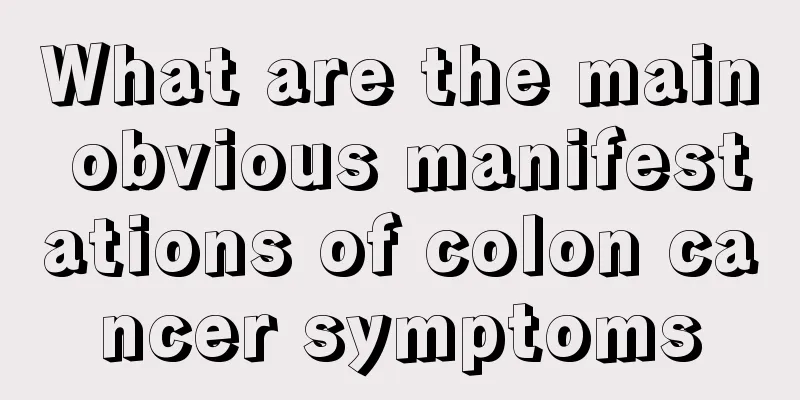What are the main obvious manifestations of colon cancer symptoms

|
If we want to detect the presence of colon cancer around us as early as possible, we must first have a certain understanding of the symptoms of colon cancer. What are the most common symptoms of colon cancer ? Let the experts introduce the symptoms of colon cancer in detail. (1) Abdominal pain and digestive tract irritation symptoms: Most patients with colon cancer have varying degrees of abdominal pain and discomfort, such as dull abdominal pain, right-sided abdominal fullness, nausea, vomiting, and loss of appetite. Symptoms often worsen after eating, sometimes accompanied by intermittent diarrhea or constipation, and are easily confused with chronic appendicitis, ileocecal tuberculosis, ileocecal segmental enteritis, or lymphomas that are common in the right lower abdomen. Hepatic flexure cancer of the colon can present as paroxysmal colic in the right upper abdomen, similar to chronic cholecystitis. It is generally believed that pain from right-sided colon cancer often reflects to the upper part of the navel; pain from left-sided colon cancer often reflects to the lower part of the navel. If the tumor penetrates the intestinal wall and causes local inflammatory adhesions, or forms a local abscess after chronic perforation, the pain site is where the tumor is located. (2) Abdominal masses: The symptoms of colon cancer are generally irregular in shape, hard in texture, and nodular on the surface. In the early stages of transverse colon and sigmoid colon cancer, there is a certain degree of mobility and mild tenderness. If ascending or descending colon cancer has penetrated the intestinal wall and adhered to the surrounding organs, chronically perforated to form an abscess, or pierced through adjacent organs to form an internal fistula, the mass is usually fixed, with unclear edges and obvious tenderness. (3) Changes in bowel habits and stool characteristics: The symptoms of colon cancer are the result of ulcers and secondary infections caused by tumor necrosis. Bowel habits change due to toxins stimulating the colon, with an increase or decrease in bowel movement frequency, and sometimes diarrhea and constipation alternating. There may be abdominal cramps before defecation, which are relieved after defecation. If the tumor is located lower or in the rectum, there may be symptoms of rectal irritation such as anal pain, difficulty in defecation, or tenesmus. The stool is often unformed and mixed with mucus, pus, and blood. Sometimes it contains a large amount of blood and is often misdiagnosed as dysentery, enteritis, hemorrhoidal bleeding, etc. The above information is about the symptoms of colon cancer. I hope it can help you. In fact, after we understand the symptoms of colon cancer, we must detect the existence of the disease in time and then treat it to control the spread of the disease. If you have any questions about the symptoms of colon cancer, you can consult our experts. Here I wish the patients a speedy recovery. |
<<: What is the best nursing method for ovarian cancer
>>: What are the best and most effective treatments for colon cancer
Recommend
How long can one live with advanced small cell lung cancer
The survival period of patients with advanced sma...
What are the autumn care methods for oily skin
Autumn is a season that people are more worried a...
You can rest when you are physically tired, but what should you do if you are mentally tired
As the pace of life continues to accelerate, more...
Can I use white vinegar to wash my face if it is dry and itchy
Dry and itchy face is a facial phenomenon that ma...
What are the early symptoms of bladder cancer
In recent years, bladder cancer has become one of...
Are oranges high in potassium?
Potassium is a trace element needed by the human ...
What is the reason why sweat stains turn yellow
Yellowing of sweat stains is actually a common si...
What are the common symptoms of lung cancer? The 4 most common symptoms of lung cancer
Lung cancer is a type of cancer that has a higher...
How to choose dentures
In our daily life, many people always have a care...
How to care for patients with tongue cancer to make them feel better
Tongue cancer is a malignant tumor located in the...
Is it good to take Chinese medicine for glioma
Glioma is generally treated with surgery, and che...
Where is the most common site of colorectal cancer?
Where is the most common site of colorectal cance...
What are the contraindications of olive effects?
Olive oil is not only edible, but also can beauti...
How do I know if I have lung cancer? If you have these 4 abnormalities in your body, it may be lung cancer
When I was watching the news, I found a case of l...
Precautions after transforaminal endoscopic lumbar discectomy
The precautions after intervertebral space surger...









